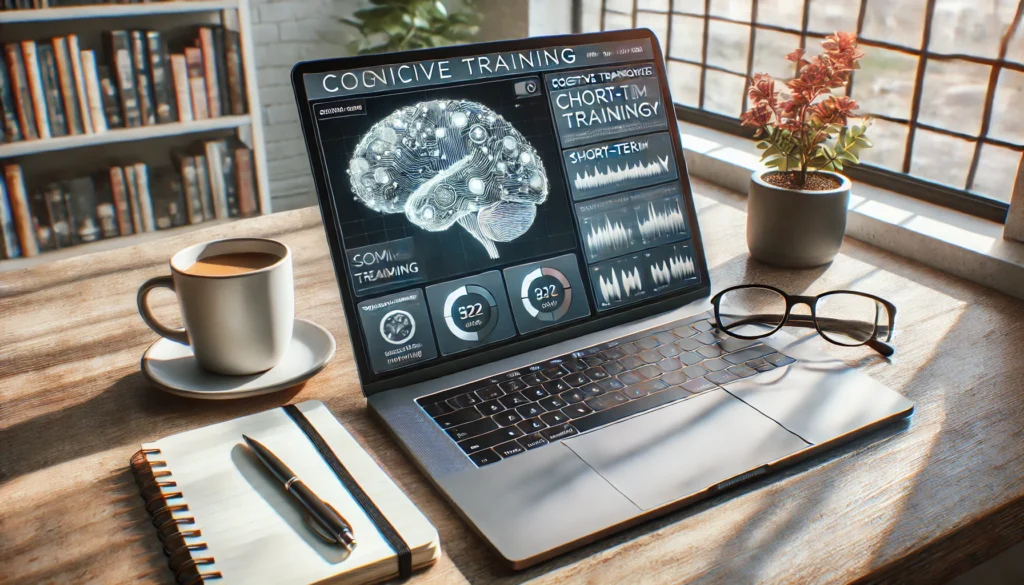Memory is a fascinating aspect of our existence. It shapes our experiences, our learning, and our interactions.
Among the different types of memory, short-term memory plays a crucial role. It’s like a mental notepad, holding information temporarily for processing.
But what if this notepad could hold more information? Or retain it for longer?
Improving short-term memory can have profound effects. It can enhance learning, boost productivity, and even improve quality of life.
This article aims to be your comprehensive guide to short-term memory boosters. We’ll delve into the science behind memory, explore practical strategies, and provide actionable tips.
Whether you’re a fitness enthusiast, a health enthusiast, or a medical patient, this guide is for you. It’s designed to help you understand and enhance your cognitive abilities, particularly your short-term memory.
We’ll explore a variety of approaches. From dietary strategies and physical exercises to mental exercises and lifestyle modifications.
We’ll also delve into holistic and alternative approaches. These can offer unique perspectives and additional benefits to your cognitive health.
Moreover, we’ll discuss how to manage health conditions that might affect your memory. We’ll provide practical tips to help you navigate these challenges.
Finally, we’ll guide you on how to track your progress. Because understanding your journey is key to maintaining and improving your cognitive health.
So, are you ready to boost your short-term memory? Let’s dive in.
You may also like: Mastic: Potential Nootropic Benefits, Dosage, Side Effects, Interactions, and Other Important Information About This Supplement
Understanding Short-Term Memory
Short-term memory is a fundamental aspect of our cognitive abilities. It acts as a mental scratchpad, holding information temporarily.
This type of memory is crucial for everyday tasks. Imagine forgetting a phone number immediately after hearing it. That’s where short-term memory helps.
In understanding short-term memory, we must consider how it interacts with other memory types. Short-term memory is a building block for long-term memory.
Information processed in short-term memory can become long-term. This transformation occurs through consolidation, a crucial function of memory.
Let’s delve deeper into what constitutes short-term memory and its role.
What is Short-Term Memory?
Short-term memory serves as a workspace for the brain. It allows quick access to immediate information for active processing.
Typically, short-term memory is characterized by its limited capacity. Most people can hold about seven items, give or take two, in this memory type.
The duration is also short, usually lasting from a few seconds to a minute without rehearsal. This fleeting nature emphasizes its temporary role.
Gaining a deeper understanding of short-term memory can help identify ways to enhance its capacity and function. Learn more about the mechanisms behind short-term memory and how it interacts with other cognitive processes.
The Role of the Brain in Memory Formation
Memory formation involves several brain regions. The hippocampus and prefrontal cortex are paramount in this process.
The hippocampus helps consolidate short-term memories into long-term ones. It’s vital for forming new memories and linking them to old ones.
The prefrontal cortex supports working memory, which is closely related to short-term memory. It handles complex tasks like decision-making and planning.
Understanding the roles of these areas helps us comprehend how memories are stored and retrieved.
Short-Term vs. Long-Term Memory
Short-term and long-term memory differ in duration and capacity.
Short-term memory deals with immediate, temporary information. In contrast, long-term memory stores information indefinitely.
While short-term memory is limited, long-term memory can hold vast amounts. This interplay ensures we process and retain important information.
The Science of Memory Boosting
Enhancing memory involves understanding intricate brain mechanisms. Our brains are powerful yet malleable systems, capable of change and growth.
Scientific research unveils various approaches to boost memory. These approaches stem from both lifestyle changes and biological mechanisms.
Understanding memory improvement starts with neuroplasticity. This fundamental process underpins the brain’s ability to adapt.
Scientists have found multiple ways to leverage neuroplasticity. By doing so, one can improve cognitive function, including short-term memory.
Let’s explore how these strategies can be applied effectively in everyday life.
Neuroplasticity and Memory
Neuroplasticity is the brain’s incredible ability to reorganize itself. It does so by forming new neural connections throughout life.
This adaptability is key in recovering from brain injuries. It also plays a crucial role in learning and memory enhancement.
Practicing new skills strengthens neural pathways. This process aids in memory retention and recall.
Long-term potentiation, a component of neuroplasticity, reinforces these pathways. Through repeated activation, memory strength improves.
Embracing activities that challenge the brain can enhance neuroplasticity. This lays the foundation for better memory function.
The Impact of Lifestyle on Memory
Lifestyle choices significantly influence memory capacity. Simple changes can lead to notable memory improvements.
Diet, exercise, and sleep are crucial. Each contributes uniquely to cognitive performance.
A balanced diet fuels brain function. Consuming omega-3 rich foods can particularly boost cognitive health.
Regular physical activity enhances brain oxygenation. This leads to improved short-term memory and overall brain health.
Sleep, meanwhile, is vital for memory consolidation. Prioritizing quality sleep can transform how effectively we recall information.
Adjusting lifestyle factors provides a comprehensive strategy for enhancing memory. Making conscious changes can yield significant cognitive benefits.
Dietary Strategies for Memory Enhancement
Nutrition plays a pivotal role in cognitive function. Choosing the right foods can significantly enhance short-term memory.
Our brains require specific nutrients to operate at peak performance. These nutrients support cell structure, neurotransmitter function, and overall brain health.
Improving diet can lead to noticeable memory enhancements. Simple changes can make a profound impact on cognitive performance.
Let’s delve into which nutrients and foods are most beneficial for memory. These dietary strategies can offer substantial support for mental acuity.
Brain-Boosting Nutrients and Foods
Certain nutrients are key to brain health. Omega-3 fatty acids, found in fish like salmon, are critical for building cell membranes.
Leafy greens, such as spinach and kale, provide antioxidants. These combat oxidative stress, which can harm brain cells.

B vitamins, particularly B6, B9, and B12, aid in neuron function. They assist in neurotransmitter production, crucial for memory.
Whole grains offer a steady release of glucose, brain fuel. Eating oatmeal or whole-grain bread ensures sustained energy.
Nuts and seeds, rich in vitamin E, protect against cognitive decline. A handful of walnuts or sunflower seeds can bolster brain defenses.
Berries, especially blueberries, also support memory. They contain flavonoids that enhance neuron communication.
Incorporating these foods into daily meals can enhance memory functions. Simple dietary adjustments can yield notable cognitive benefits.
Beyond these nutrients, adopting strategies to enhance overall cognitive skills can significantly elevate mental performance. Discover how tailored dietary choices and other methods can sharpen cognitive abilities.
The Role of Hydration in Cognitive Performance
Hydration is vital for brain function. Dehydration can hinder concentration and memory.
Our brains rely on water for optimal operation. Just a small loss of fluid can affect cognitive performance.
To maintain hydration, aim to drink eight glasses of water daily. This can vary based on activity level and climate.
Herbal teas and water-rich foods like cucumbers can also aid hydration. Staying hydrated supports both body and mind.
Supplements and Herbs for Memory Support
Certain supplements may enhance cognitive function. Omega-3 capsules, for instance, can be beneficial for those lacking fish in their diet.
Ginkgo biloba is another popular memory aid. It may improve blood flow to the brain, supporting cognitive functions.
Curcumin, found in turmeric, has potential neuroprotective properties. It may combat inflammation, a factor in cognitive decline.
Always consult a healthcare provider before starting supplements. They can guide you based on individual health needs.
By integrating these dietary strategies, both natural foods and supplements, individuals can work towards improved memory and cognitive health.
Physical Exercise and Cognitive Function
Physical exercise is not only beneficial for body health but also significantly impacts brain health. Engaging in regular physical activities can enhance memory and improve overall cognitive function.
Exercise promotes increased blood flow, delivering oxygen and nutrients to the brain. This can enhance short-term memory by supporting the growth of new neurons and connections.
The brain’s plasticity is also positively influenced by physical activity. This means that our brains can better adapt and reorganize in response to new learning experiences.
Different types of physical exercises can offer unique benefits for brain health. Integrating a combination of these can lead to the most balanced cognitive improvement.
Aerobic Exercises to Increase Short-Term Memory
Aerobic exercises, such as running or brisk walking, have been shown to enhance memory and thinking skills. These activities increase heart rate, which pumps more blood to the brain.
Studies suggest that regular aerobic exercise can lead to growth in the hippocampus, the brain area associated with memory. This can result in improvements in both short and long-term memory.

High-intensity interval training (HIIT) is another form of aerobic exercise that can benefit cognitive function. Short bursts of high-energy activity followed by rest periods can stimulate brain function.
Activities like swimming, cycling, or even dancing can also serve as enjoyable aerobic exercises. Consistency is key, so aim for at least 150 minutes of moderate aerobic exercise per week.
Incorporating effective strategies to complement aerobic exercises can maximize memory improvement and cognitive performance. Explore additional techniques to enhance memory through exercise.
Resistance Training and Brain Health
Resistance training, or strength training, involves working against a force to build muscle. This type of exercise can also promote cognitive benefits.
Lifting weights or using resistance bands are typical forms of strength training. They encourage the release of growth factors, aiding neurogenesis, the process of forming new neurons.
Improving muscle strength also has been linked with better brain function. Regular strength training sessions can enhance memory, particularly in older adults.
To gain these cognitive benefits, include resistance exercises two to three times per week. Focus on major muscle groups for balanced strength and brain health.
Balance and Coordination Exercises
Balance and coordination exercises involve activities that challenge the body’s stability. These can include yoga, tai chi, or simple balance drills.
These exercises are beneficial for brain health as they require mindful attention and adaptability. This engages areas of the brain associated with memory and planning.
Core strength and stability exercises also contribute positively to cognitive functions. Having a strong core can improve your ability to perform balance-related movements.
Moreover, integrating varied movements, such as those in dance or martial arts, can enhance both physical and cognitive flexibility. This diversity challenges the brain in novel ways.
Commit to regular balance and coordination exercises to see improvements in memory and overall brain function. This integrated approach supports both mind and body harmony.
Mental Exercises for Short-Term Memory Improvement
Improving short-term memory involves engaging in targeted mental exercises. These activities can stimulate brain areas related to memory and cognitive function.
Mental exercises are essential for maintaining and enhancing cognitive abilities. They involve tasks that challenge the brain, promoting neuroplasticity and facilitating learning.
The diversity of mental exercises caters to different cognitive skills. This includes memory, concentration, problem-solving, and recall abilities.
Practicing these exercises regularly can lead to noticeable improvements. They not only enhance memory but also fortify overall mental resilience.
Implementing effective techniques specifically designed to boost memory can significantly enhance your cognitive performance. Explore detailed and actionable strategies for improving memory.
Brain Games and Puzzles
Brain games are specifically designed to challenge memory and thinking skills. These can include apps and online games focused on boosting cognitive abilities.
Puzzles like crosswords and Sudoku are excellent for mental stimulation. They require strategic thinking and enhance memory by requiring the recall of past experiences.
In addition to traditional puzzles, digital brain games often provide comprehensive tracking of cognitive progress. This can encourage consistent engagement and improvement.
Research indicates that regular participation in challenging mental tasks can slow cognitive decline. This is particularly beneficial for aging individuals looking to preserve cognitive health.
Diversifying the types of games and puzzles you engage with keeps the brain constantly challenged. This variety is key to building robust cognitive skills.
Mnemonic Devices and Techniques
Mnemonic devices are strategies used to enhance memory retrieval. They help encode information in a way that is easier for our brains to recall.
One common technique is creating acronyms. By taking the first letters of a series of words and forming a new word, information becomes easier to remember.
The method of loci is another effective mnemonic device. This involves visualizing placing information in specific locations within a familiar setting.
Chunking is a technique that groups information into smaller, manageable units. This approach reduces cognitive load and increases retention.
Applying mnemonic techniques in daily life can significantly enhance word recall. They provide a structured approach to memorizing complex information.
Mindfulness and Meditation Practices
Mindfulness involves focusing on the present moment, fully engaging your attention without judgment. This practice can significantly improve concentration and memory.
Meditation exercises cultivate mindfulness and encourage mental clarity. Regular practice has been shown to enhance brain areas associated with learning and memory.
Engaging in mindfulness and meditation reduces stress, a known factor that impairs memory. By managing stress, these practices promote cognitive health.
Guided meditation sessions are available online, making them accessible to everyone. These sessions can help beginners establish a meditation routine.
Breathing exercises integrated into mindfulness practices improve focus. They encourage oxygen flow to the brain, which is crucial for memory enhancement.
Incorporate mindfulness into daily routines, even in short bursts, to see sustained benefits. Just a few minutes each day can yield significant cognitive improvement.
Lifestyle Modifications to Boost Memory
Effective lifestyle changes can significantly impact cognitive function, including memory. Simple modifications in daily habits promote sustained cognitive health.
Adopting a holistic lifestyle approach helps in integrating memory-enhancing practices seamlessly. It combines activities that benefit the mind and overall wellbeing.
The interplay between daily activities and cognitive health is profound. Small but consistent changes can lead to substantial improvements in memory.
Lifestyle modifications are manageable yet impactful means to enhance memory. They require commitment but offer long-term benefits.
Below are some strategies you can incorporate into your daily routine:
- Prioritize sleep to ensure effective memory consolidation.
- Practice mindfulness to reduce stress and anxiety.
- Engage in regular physical exercise for brain health.
- Maintain a balanced diet rich in brain-boosting nutrients.
- Cultivate social connections and engage in mentally stimulating activities.
Sleep and Memory Consolidation
Sleep plays a critical role in memory consolidation. It transforms short-term memories into lasting ones during specific sleep stages.
Adequate sleep ensures that the brain processes and stores information properly. This process is vital for effective learning and recall.
Disruptions in sleep patterns can severely impact memory. Lack of sleep impairs the brain’s ability to form new memories and retrieve existing ones.
Creating a regular sleep routine fosters better sleep quality and duration. Consistent sleep schedules ensure the brain functions optimally.

Implementing sleep hygiene practices, such as reducing screen time before bed, can enhance sleep quality. This support is crucial for memory retention.
Stress Management Techniques
Chronic stress negatively affects memory and cognitive function. It impacts brain regions involved in memory, like the hippocampus.
Stress management techniques are essential for maintaining cognitive health. They help mitigate the adverse effects of stress on memory.
Deep breathing exercises are simple and effective stress reducers. They promote relaxation and enhance the brain’s cognitive performance.
Mindfulness and meditation are potent tools for stress relief. They help cultivate mental resilience and clarity, beneficial for memory enhancement.
Adopting a regular routine that incorporates stress management practices can protect cognitive health. This approach cultivates a stress-free environment for optimal memory function.
Incorporating strategies to enhance quick thinking can also improve stress resilience, sharpening mental clarity under pressure. Learn more about actionable techniques to refine quick-thinking skills and bolster cognitive performance.
Social Engagement and Cognitive Stimulation
Social interaction is a powerful cognitive stimulator. It encourages mental engagement and sharpens memory-related skills.
Engaging in conversations and group activities keeps the brain active. Social activities often require quick thinking and memory recall.
Volunteering can be a fulfilling way to engage socially while benefiting cognitive health. It combines social interaction with cognitive stimulation.
Participating in community groups or clubs offers opportunities for regular social interaction. These settings often promote mental agility and learning.
Being socially active combats loneliness and boosts mental wellbeing. It provides a supportive environment conducive to memory enhancement.
Regular social engagements ensure consistent cognitive stimulation, important for memory maintenance. They provide diverse and dynamic mental challenges.
Holistic and Alternative Approaches
Holistic and alternative approaches offer diverse methods for memory improvement. They focus on balancing mind, body, and spirit.
These practices often address the root of cognitive issues. By doing so, they promote a more comprehensive path to health and wellbeing.
Integrating these techniques can complement traditional methods. It enhances their effectiveness and supports overall cognitive enhancement.
Alternative approaches may seem unconventional. However, they often provide unique benefits supported by ancient wisdom and modern research.
The holistic perspective involves viewing the body as a whole. This view emphasizes the interconnection between physical health and cognitive function.
Common holistic practices include yoga, meditation, acupuncture, and aromatherapy. Each offers distinctive techniques for boosting memory and cognition.
These practices stress the importance of lifestyle changes and proactive health management. They advocate for regular practice to achieve noticeable improvements.
Yoga and Memory Enhancement
Yoga is not just physical; it also enhances mental clarity. Regular practice has been linked to improved cognitive function.
The mindful movements and deep breathing in yoga reduce stress. This reduction creates a mental environment conducive to memory enhancement.
Specific yoga poses increase blood flow to the brain. Enhanced circulation nourishes and revitalizes cognitive processes.
Incorporating yoga into daily routines helps sustain mental sharpness. It encourages focus, concentration, and memory retention.
The Role of Acupuncture and Traditional Medicine
Acupuncture, a staple of Traditional Chinese Medicine, offers cognitive benefits. It involves inserting thin needles at specific points on the body.
This practice is believed to stimulate and balance the body’s energy. In doing so, it may enhance brain function and memory.
Many studies suggest acupuncture can improve cognitive health. It is thought to reduce stress and support neurological wellbeing.
Traditional medicine also includes herbal remedies. Some herbs are known for their potential to enhance memory and focus.
Essential Oils and Aromatherapy
Essential oils are a popular holistic method for cognitive support. Aromatherapy, their main application, involves inhaling beneficial scents.
Certain essential oils are believed to support mental clarity. Oils like rosemary and peppermint can invigorate the mind and enhance focus.
Studies suggest that these oils may help improve memory. Inhalation stimulates brain regions involved in recall and cognitive processing.
Aromatherapy can create a calming and focused mental environment. This setting supports both memory retention and stress reduction.
Oils are versatile; they can be diffused or applied topically. This adaptability makes them easy to integrate into daily routines.
Regular use of essential oils might complement other memory-enhancing practices. They provide an immediate and soothing way to support mental function.
Holistic and alternative approaches offer diverse strategies for memory enhancement. They encourage a balanced lifestyle, fostering long-term cognitive health.
Managing Health Conditions for Better Memory
Managing health conditions can play a critical role in preserving memory. Chronic illnesses often impact cognitive functions.
Effective management can help mitigate these effects. It’s crucial to approach these health issues proactively.

Addressing medical conditions is as important as lifestyle changes. Combining both strategies aids cognitive resilience.
Chronic diseases and the medications used to treat them can influence memory. Understanding these effects is vital to maintaining cognitive health.
A comprehensive management plan includes medical and cognitive considerations. Regular consultations with healthcare professionals can guide this process.
The Impact of Chronic Illnesses on Memory
Chronic illnesses such as diabetes and hypertension have implications on memory. These conditions alter blood flow and nutrient supply to the brain.
Poorly managed diseases can accelerate cognitive decline. Thus, effective disease control is crucial for memory preservation.
Beyond physical symptoms, chronic illness can lead to stress and anxiety. This emotional stress can further impact memory and cognitive health.
Regular monitoring and control of these diseases may help protect against cognitive impairment. Effective treatment plans often include lifestyle and dietary changes.
Medication Management and Cognitive Health
Medications can have side effects that affect memory. Some prescriptions, while necessary, may contribute to memory lapses.
Understanding these effects allows patients to address them. Open communication with healthcare providers is key.
Sometimes, changing dosages or medications can alleviate cognitive side effects. Pharmacists can offer insights on interactions.
Keep a detailed list of medications and their effects. This can be useful during medical appointments.
Discuss concerns about memory-related side effects with your doctor. They can suggest alternative treatments or management strategies.
Managing medications effectively helps maintain cognitive health. It’s a vital step in a comprehensive approach to memory enhancement.
Tracking Progress and Maintaining Cognitive Health
Tracking progress is key when working to improve memory. Consistent monitoring helps measure effectiveness and adjust strategies.
Incorporating structured assessments can guide your journey. These might include memory tests or cognitive challenges.
Establishing a baseline of your cognitive abilities is crucial. It provides a reference point for future improvement.
Regular assessments can identify patterns and specific areas needing attention. This insight can refine your approach.
Simple journaling can also be effective. Documenting daily memory challenges can reveal trends over time.
Look for progress in daily tasks, such as remembering names or completing crosswords. Celebrate these small victories.
Effective memory improvement should be enjoyable and motivating. Keeping a positive mindset boosts adherence to routines.
Sharing achievements with friends or a support group can further solidify progress. Engagement fuels motivation.
Setting Goals and Monitoring Improvements
Setting clear goals is fundamental to improving cognitive function. Define what you want to achieve, such as remembering more details at work.
It’s important to break larger goals into smaller, actionable steps. This makes the process less daunting and more manageable.
Regularly review your goals and note any improvements. This reflection can highlight progress and motivate continued efforts.
Use tools like apps or digital trackers to log improvements. These can provide detailed insights and visual progress reports.
The Importance of Regular Check-Ups and Testing
Regular check-ups are vital in monitoring cognitive health. They can detect early signs of cognitive decline.
Healthcare providers can perform specific cognitive tests during appointments. These tests offer a detailed view of brain health.
Routine medical evaluations also assess overall health factors affecting cognition. Conditions like hypertension can impact memory.
Discuss any concerns about memory changes with your healthcare provider. Their insight can guide you in addressing issues promptly.
Access to professional advice can tailor your memory improvement strategy. Personalized recommendations enhance effectiveness.
Keeping up with check-ups ensures timely interventions. Proactive healthcare keeps cognitive decline at bay and supports long-term well-being.
Conclusion: Integrating Memory Boosters into Your Routine
Embracing short-term memory boosters can transform daily life. Integrating these strategies into your routine requires a dedicated approach.
Start with small steps to incorporate changes gradually. Consistency is essential in fostering significant improvements in memory function.
Select memory-enhancing activities that align with your lifestyle. Customizing your plan ensures it’s practical and sustainable.
Remember, it’s about forming habits that enrich cognitive abilities. Regular practice and commitment yield the best results.

Tracking progress can motivate continued use of memory boosters. Celebrate milestones, however small, to maintain enthusiasm in your journey.
Integration is a personal process, and what works best can vary. Listen to your body and mind to find the most effective techniques.
Diversify your approach by blending different strategies. From dietary changes to mental exercises, each aspect can contribute to a balanced improvement effort.
Maintaining a growth mindset is important for long-term success. Openness to new methods ensures adaptability and continuous cognitive development.
Ultimately, enhancing short-term memory is within reach. With steady dedication and openness to integrating diverse techniques, cognitive vitality is attainable.
By prioritizing these memory boosters, you nurture not only brain health but also overall well-being. The benefits extend far beyond memory, enriching multiple aspects of life.
Further Reading
BBC: An effortless way to improve your memory
The Guardian: Is your memory struggling? Here are 10 ways to boost your recall
Inc: 9 Unusual Ways to Improve Your Short-Term Memory, Ranked by Weirdness
Important Note: The information contained in this article is for general informational purposes only, and should not be construed as health or medical advice, nor is it intended to diagnose, prevent, treat, or cure any disease or health condition. Before embarking on any diet, fitness regimen, or program of nutritional supplementation, it is advisable to consult your healthcare professional in order to determine its safety and probable efficacy in terms of your individual state of health.
Regarding Nutritional Supplements Or Other Non-Prescription Health Products: If any nutritional supplements or other non-prescription health products are mentioned in the foregoing article, any claims or statements made about them have not been evaluated by the U.S. Food and Drug Administration, and such nutritional supplements or other health products are not intended to diagnose, treat, cure, or prevent any disease.



